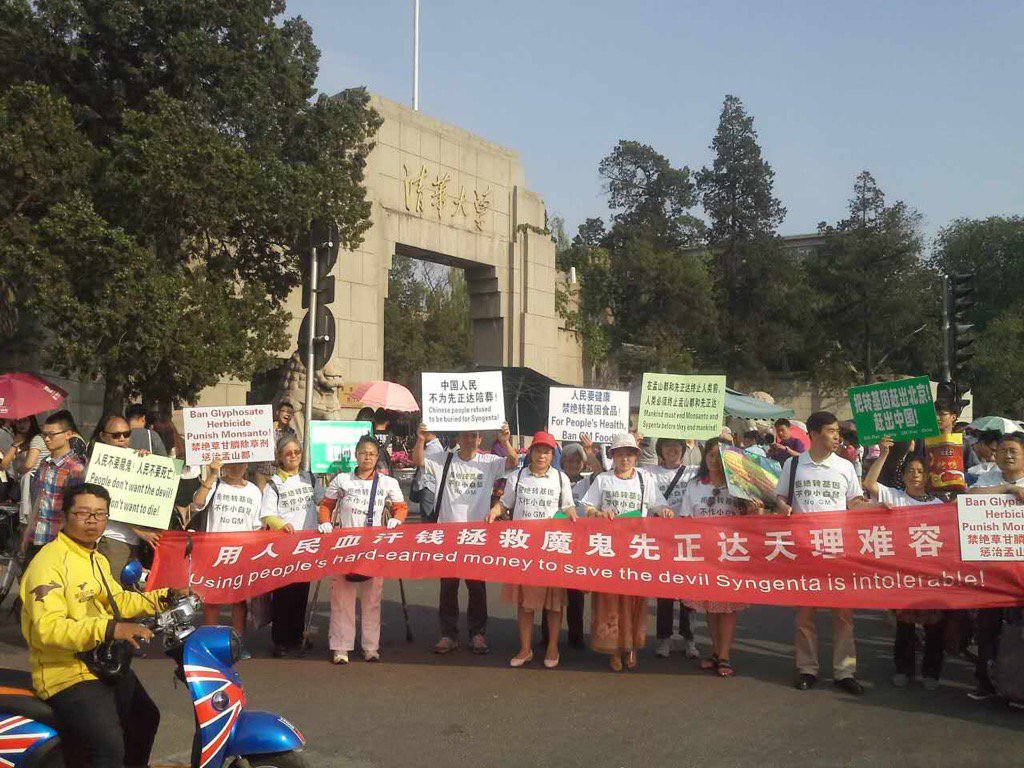You can read about the reason I'm asking this in the spoiler. TLDR I'm just wondering if there's some debunking I can do since western media is oh-so-not-trustworthy
spoiler
I'm in some IRL debate (Well, online but in a closed chat) with some libs. They are talking about the right-wingers saying Taylor swift is being paid off to spread democratic votes, whatever, hollyweird are all dems, no conspiracy needed.
I mentioned that we need to actually, you know, actively keep conspiracy theories from spreading, and my liberal friend is gishgaloping a bit, but I'll bite since they are sincere, even if wrong.
They came back with "Well china has conspiracy theories", which I didn't mention china, I didn't mention anything about censorship, it's just gishgalloping like I said, but anyway..
Any truth to this one? I mean being anti-gmo is not rare, so I'm not surprised if it was true. I don't have a good handle on high quality china news (And cannot read their sites myself, even with translators it's a slow experience).
Edit: Oops, I had to go AFK after posting this and didn't get to clarify as the comments were all being. I meant do Chinese people broadly believe in the conspiracy theories around GMOs such as causing cancer or making your DNA change or something like that. Of course GMOs are complicated science and are a tool used by capitalists to patentize (did I make up that word? Lol) the food industry, which is a natural science and typically difficult to patent.


Thanks to @yogthos@lemmygrad.ml for the ping. Let's look at the study linked by the article: Public perception of genetically-modified (GM) food: A Nationwide Chinese Consumer Study https://www.nature.com/articles/s41538-018-0018-4
I'm not going to question what is "statistically relevant", but I think it's insane for Alliance for Science to extrapolate 13.8% of 2063 people to all 1.4 billion people in China (regardless of age or background) to get 190 million.
If we look at the results for the question:
The option wasn't "I agree that GM tech is US bioterrorism against China", it was "The question is presenting an opinion that suggests Chinese patriots should oppose GM food because they are part of US bioterrorism against China, I agree". What a twisted way to conduct a survey.
Besides the Chinese person mentioned in the article (彭光谦, Peng Guangqian, Baidu wiki includes the GMO controversy: https://baike.baidu.com/item/%E5%BD%AD%E5%85%89%E8%B0%A6/8993457) there was also this person called 崔永元 (Cui Yongyuan, Baidu wiki: https://baike.baidu.com/item/%E5%B4%94%E6%B0%B8%E5%85%83/324929) who was a famous CCTV show host, and he was anti-GMO.
China's Ministry of Agriculture and Rural Affairs responded to Peng Guangqian's questions about transgenic technology in this 2013 article (http://www.moa.gov.cn/ztzl/zjyqwgz/sjzx/201310/t20131018_3634054.htm), and created this special page for info related to transgenic technology (http://www.moa.gov.cn/ztzl/zjyqwgz/) that is still updated to this day.
Even though it may be interesting to some, but I think finding out how many people in China believe "the US is carrying out bioterrorism against China via GM food" is not a worthwhile thing to do, compared to the more important question of how to carry out research regarding transgenic technology safely and scientifically. I personally think transgenic tech is inherently a complicated topic so I'm neutral about it.
There are other theories regarding US bioterrorism like whether the US caused covid-19, no matter if it was intentional or by accident, now that theory has more support and is indirectly encouraged by the Chinese government. For example, from this Chinese Foreign Ministry Regular Press Conference transcript on 2021-08-27: http://ipc.fmprc.gov.cn/eng/fyrth/202108/t20210827_9130747.htm
It's as if these surveys are intentionally crafted to give the result they're fishing for.
Also the option "Disagree, debate on GM food should base on science" also feeds into Chinese liberals' talking point that Chinese patriots favor patriotism over science, as if those two are mutually exclusive.
Thank you for responding! I'm happy to be able to pick the brains of real people with real experiences on this platform.
I didn't have a long time to look at the study itself, so I apologize that this was easy to find. But were those questions translated? I just don't know if "patriot" is a common word over there.
It does seem weird the way they phrased things as if there are real binaries between them. Why can't somebody both be pro-science and pro-patriot?
I have an undergrad in psychology at an American university, which for the most part is kind of a waste of time, but I did spend some time reading research and doing and reading the results of surveys, and this always bugged me. Surveys are just a terrible way to truly understand somebody's opinion.
Yeah the questions were translated and the original data in Mandarin is not publicly available, from the study:
The usage of 爱国者 (patriot) is probably not as common as 爱国 (patriotic), 爱国主义 (patriotism), or even 小粉红 (pinky/pinko, both a derogatory term to refer to Chinese patriots/nationalists, but also normalized by patriots to use to call themselves, kind of like the n-word for African Americans). The Chinese tech brand aigo is literally 爱国者 (patriot) in Chinese. Mentions of US "Patriot" missiles in the news are also instances where you can find 爱国者 (patriot).
As for surveys themselves, I can't speak for whether it is accurate to paint a representation of any large population with a sample size of less than 0.00015% or 1 in 666,667 of the population, even if it's claimed to be statistically relevant. In this case this particular question about US bioterrorism was constructed in such a loaded way that the results shouldn't be taken seriously.
Thank you for your insight!